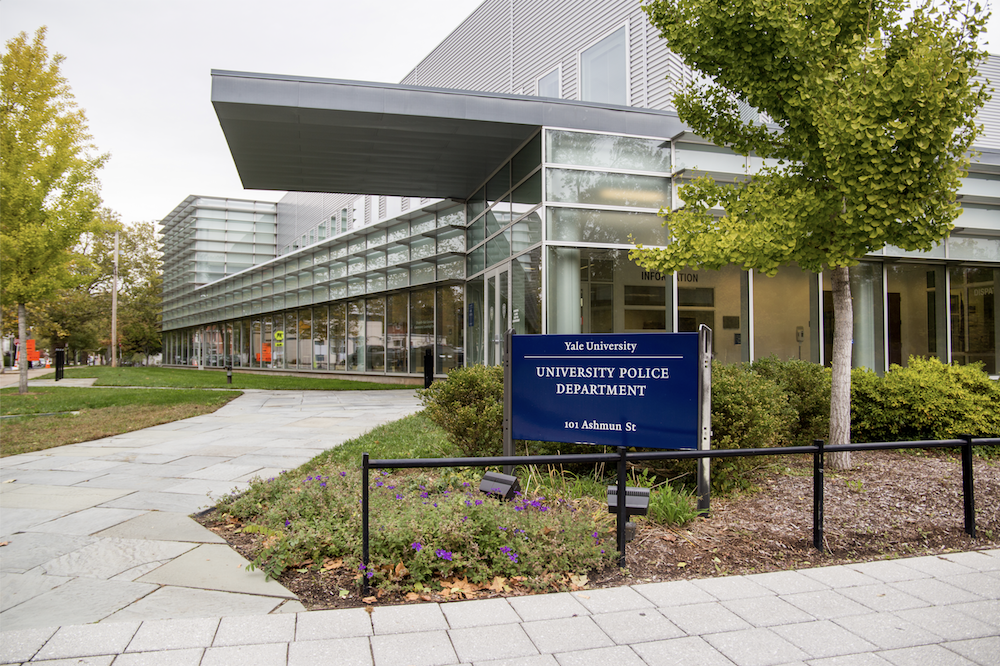
Yale Police Chief Ronnell Higgins last Thursday posted a strongly worded statement on Facebook rebutting a post by New Haven resident Jeannia Fu claiming that YPD police officers engaged in racist policing last week.
In a statement to the News and in her Facebook post, Fu said that on April 18 a group of “young kids, black youth who were maybe 9, 10, 11 years old” were surrounded by two police cars and three uniformed officers on a bike path near Yale Health and Benjamin Franklin College. When she went to check on the situation, Fu added, a New Haven police officer got “confrontational” and said Fu should not have tried to interfere in their “community” policing efforts. Then she asked Yale cop Christine Heffernan if she called the New Haven police, Fu said, to which Hefferman responded “you know with these kids around these rough spots you gotta teach them young how to behave.” In her post following the incident, Fu argued that the cops are “trying to create an arrest pipeline from the sidewalk.”
“That people found out about what happened and voiced their concerns is important,” Fu said. “The Yale community has a responsibility to understand and address the impacts of its police force on local communities. We owe it to these youth to not let what happened be passed off as ordinary.”
But, in his statement, Higgins stood by the YPD’s action, saying there was “absolutely no racism in this situation.” According to Higgins’ account of the incident, a group of four or five boys was trying to enter Benjamin Franklin, so someone called the Yale police. While the police were talking “politely and respectfully” to the boys, Higgins said, one of the boys recognized an African-American police officer as a community member who gave out Rice Krispies Treats during the summer.
Higgins noted that no one was arrested and added that he was “saddened” to see the “derogatory” and “inflammatory” emails he received after Fu posted about the incident.
“The idea that Yale police officers are somehow ‘creating a pipeline to jail’ flies in the face of who we are and how we act on a daily basis,” Higgins said in his post. “As a proud resident of New Haven, as a police chief, and as an African-American, I am all too familiar with racism and how quickly hatred can spread — particularly on social media.”
Fu told the News that, in his response, Higgins made it seem “normal” to call the police on children. She said that it is hard to imagine white children playing near Yale’s dorms being taught the same “lesson” by the police.
Both Fu and Higgins Facebook posts attracted significant attention after they went online. Fu’s post was shared 14 times and received 71 Facebook “reactions,” with several people commenting that they would email Higgins about the incident. Higgins’ post received roughly 280 Facebook reactions and about 40 comments and was shared 23 times.
Higgins told the News that it was “gratifying” to see how many people responded positively to his post. Vice President for Communications Eileen O’Connor also said the response to Higgins’ post was “touching.”
Rachael Youngman, who commented on both Fu’s and Higgins’ posts and whose daughter attended Yale, spoke out in defense of the Yale Police Department. She told the News that when she helped moved her daughter into her first-year dorm, she encountered many police officers whose “friendly presence” made her happy to drop her daughter off on a “safe campus” and a “place where the officers seemed happy to be of help.”
“It’s a police department that parents and students can be proud of, and I hope YPD knows that they’re much appreciated,” Youngman told the News.
Still, not everyone agrees with her.
Victor Padilla ’20, a New Haven resident and Yale student, said he thinks concerns about the YPD among city residents stem from Yale police officers having different standards of civil conduct for people inside and outside the Yale community.
“From my experience it’s rare for Yale students to be approached by patrols or police agents, even if they are drunkenly walk backing to their dorms, making all types of noise and disturbance,” Padilla said. “But this might be just a more general trend in the way the police perceives a generally white, wealthy, privileged student body, and the way it perceives a predominantly [person-of-color] community like that of New Haven.”
Sierra-Marie Gerfao DIV ’17, a New Haven resident who lived in Yale graduate housing while attending school, said the philosophy at Yale is “better safe than sorry” as opposed to “safety comes from interacting with our neighbors.” She said this philosophy leads to the “overpolicing” of some members of the community.
Though Gerfao noted that she is not the right person to ask because she is a white woman and has not experienced any racism personally, she said some of her African-American friends have been “approached with suspicion by the YPD when going about everyday activities.”
Higgins declined to comment further on Padilla’s and Gertao’s criticisms.
Ashna Gupta | ashna.gupta@yale.edu
Britton O’Daly | britton.odaly@yale.edu
Correction, April 27: A previous version of this article said that Higgins did not respond to a request for comment. In fact, he declined to comment.







